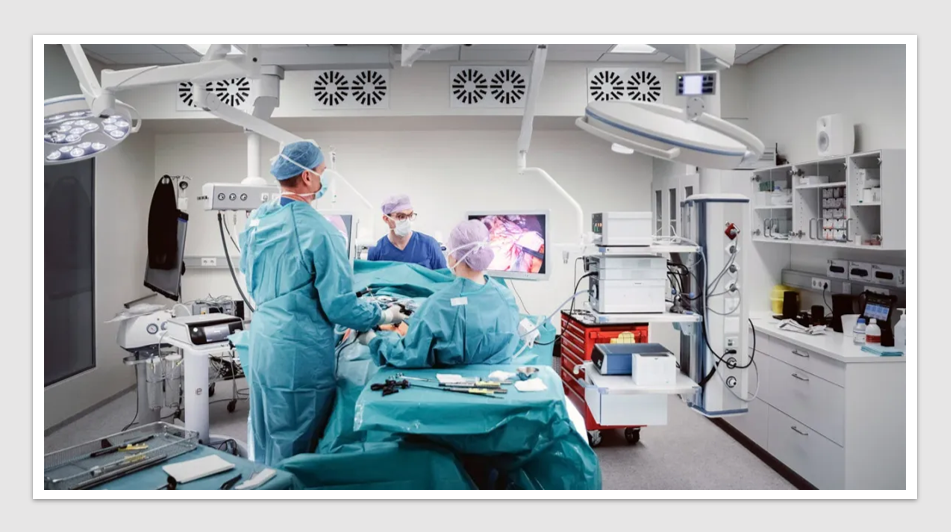News & Trends - MedTech & Diagnostics
Market access and funding key barriers to MedTech innovation, says past President of Stryker Asia-Pacific

MedTech News: In an interview with Health Industry Hub, Graham McLean, past President and current Advisor of Stryker Asia-Pacific, explored the company’s regional contributions during the COVID-19 pandemic, shared his leadership model in managing the extraordinary levels of disruption during the crisis and discussed how the MedTech sector needs to evolve in bringing innovative medical technologies to the Asia-Pacific market.
Health Industry Hub: How did Stryker step up in contributing to the management of the COVID-19 crisis in the Asia-Pacific region?
Graham McLean: I remember that I was in Korea early in 2020 when I sat down with my team on a call and said we’ve really got to start thinking about this situation a lot more deliberately and carefully.
We quickly set up a number of work streams and a steering group across Asia Pacific. The workstreams covered protocols, policies and procedures to keep employees safe in the office and in hospitals, and the management of our customers in a COVID environment.
We focussed on what we needed to do within Stryker to keep the wheels turning and at the same time contribute to supporting government efforts in the fight against COVID-19. We collaborated early on with local authorities and local industry associations.
To support healthcare capacity in the Asia Pacific region during the pandemic, Stryker’s South Pacific team collaborated with the Australian Government and local manufacturers to produce our Emergency Relief Bed in Australia.
Stryker Japan made donations of personal protection equipment (PPE), such as gowns, to where the demand was critically high. Stryker Japan also released its Emergency Relief Patient Cover that provided an additional barrier to protect healthcare workers by covering infected patients.
Health Industry Hub: What has been your leadership model in managing the extraordinary levels of disruption during the pandemic?
Graham McLean: A lot of it came down to having very transparent, regular and open communication with different levels of the organisation. The initial communication, with country leaders, HR and steering groups including employees nominated to work in these work streams, was heavily focussed on getting the right messages out quickly.
I had regular town halls with the top 100 leaders in the region to brief them with as much information as I could on what was going on and making sure that we were sharing learnings across countries.
Getting the right people together to quickly tackle typical issues and questions raised by employees in-person or through the central database was essential.
We had a communication group that developed materials that we served to all the countries to ensure that the key messages were consistent across the region and our leaders were informed and equipped to talk to their teams.
Additionally, employees, especially the commercial team members, were redeployed within the organisations in the region to work on other projects to keep them motivated and engaged. Certainly, here in Australia, we redeployed probably half our people at one point.
Health Industry Hub: The potential of digital health has been emphasised during the pandemic creating many opportunities to modernise the healthcare system. What are Stryker’s plans in driving digital healthcare through smart devices?
Graham McLean: Most of our products in the future will have some digital element to them. That is a huge area of investment and innovation for us.
We have smart beds that will tell you when a patient needs to be turned over to reduce bed soars, helping make it easier to care for patients.
We have robotic surgeries for hip and knee replacements and 20% of knee surgeries in Australia last year were done robotically.
Stryker is also a leader in 3D printed spinal and knee implants. We have the biggest orthopaedic 3D printing factory in the world in Ireland. This opens up the opportunity to have bespoke custom fit implants in the future particularly for oncology patients.
Today, we have a trial in Australia, in a research centre with a number of university colleagues where we’re able to have regulatory approval to fit 3D printed implants that are made on site for patients with bone cancer. Over the next few years that will become a huge growth area in oncology.
These innovations are going to transform healthcare and revolutionise efficiency, reduce risks during surgery and enhance patient outcomes.
Health Industry Hub: What are the biggest challenges facing the medical devices industry in bringing innovative medical technologies to the Asia-Pacific market?
Graham McLean: The biggest challenges for the foreseeable future are market access and funding for healthcare.
Firstly, the key bottlenecks that we need to consider are around the regulatory approval processes. For example, the regulatory pathway to approve 3D printed products or robotics are completely different to conventional products.
We are getting stuck within the regulatory process, because quite rightly, the regulator is asking questions that have never been asked before and we are providing solutions to questions they have never had to think about.
It concerns me that it takes such a long time to get products to the market.
The MedTech sector developing these innovations needs to actively educate and constructively engage with the regulators and government to enhance trust and assist them in developing new regulatory pathways.
The development and approval of the COVID vaccine has been a really instructive learning about accelerating regulatory pathways to market and maybe embracing some of the risks a little bit more as the benefits for patients clearly outweigh the risks of progressing slowly.
Secondly, funding is always going to be a challenge because the demand for healthcare is always going to outstrip the ability to pay for it. We need to find ways of making healthcare more efficient and more productive to get the access that patients need to the products that they need.
In Australia we have an outstanding healthcare system and most of the time patients get what they need. However, in many Asia Pacific countries the demand is enormous. There are hundreds of millions of people who do not have access to healthcare even at the very basic levels.
Health Industry Hub: How do you see the medical devices sector evolving to meet the requirements from key stakeholders in the post-COVID future?
Graham McLean: We already work very closely with clinicians and surgeons because they are involved in the innovation. They are actively involved in developing the solutions, products and procedures with us.
In Australia, there is a difficult environment with the health funds as they seek to drive medical devices costs down for their own benefits. That worries me. The dialogue needs to be more transparent as the health funds are spreading misinformation that is misleading the government and consumers.
In other Asia Pacific countries, the issue is around educating governments so decisions are made with industry consultation and the profound impacts on patient care are considered carefully. An example is in India where overnight they imposed a ceiling on how much a company can recoup from knee replacement and stents and they basically cut the price by 75% and 90% respectively. It meant that multinationals withdrew from the market impacting medical devices necessary for patient care.
Despite these challenges, the medical devices sector is the most exciting industry to be in and I’m incredibly proud of all that our people do. We have such driven and passionate people who are working with real purpose and vision for the patients and customers. I’m incredibly grateful for the wonderful time I’ve been able to enjoy as part of this industry over the last 16 years.
About Graham McLean
Graham McLean became President of Stryker, Asia Pacific, in January 2017 and was responsible for Asia (China, India, Korea, ASEAN), Australia/New Zealand and Japan businesses. He also sat on the Stryker global Executive Leadership team.
Mr. McLean joined Stryker in January 2005 at the South Pacific business in Sydney, Australia. Initially appointed as Finance Director, he took on additional responsibility for IT and Operations in the following years. He took on assignments for the International Division in 2010 and 2011 before being appointed Managing Director/President of Australia/New Zealand in 2012 where he also sat on the MTAA Board for 3 years. In January 2015 he became President of Japan and was on the AMDD Board for 2 years.
News & Trends - MedTech & Diagnostics

Bariatric surgery trumps Novo Nordisk’s Wegovy in cost-effectiveness and durability
MedTech & Diagnostics News: Bariatric surgery emerges as cost-effective, boasting superior and enduring weight loss outcomes over a five-year span […]
MoreNews & Trends - Pharmaceuticals

Aussie digital health company hits new milestone in AstraZeneca partnership
Pharma News: Fewer than 50% of asthma patients adhere to their prescribed preventative medications. An Australian digital health company has […]
MoreDigital & Innovation

Medical drone to reduce health equity gaps in rural and remote Australia
A specialised medical drone which increases accessibility to essential health services such as pathology, medicines, and telehealth services in rural […]
More